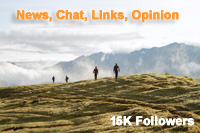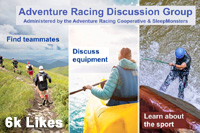Adventure on the Oregon Trail
Press Release / 02.05.2019



With adventure racers of the calibre of Jason and Chelsey Magness as Race Directors, the Oregon wilderness to set a course in and the competition of international teams from an AR World Series race there were high hopes of Expedition Oregon, and it delivered.
The race was a demonstration event last year, and the only AR World Series qualifier in the USA this year, attracting teams from Canada, Sweden, France, Uruguay, and a very strong US entry. The Race Directors had promised a technically challenging and fun course with a few surprises and the first stage was a snowshoe climb over the volcanic Maiden Peak.
The weather was ice cold and crystal clear and from the summit, teams had an amazing view over the whole course before descending to start a 30 mile packrafting stage which included a trek across the broken terrain of a lava field.
ARWS Race Referee Adrian Crane commented, “It was a tough, damp (on the rivers) and chilly race. The start was on snowshoes then into the water overnight with ice on all the racers as they navigated lakes, rivers and lava fields. At TA 2 the French team Alpha Dental still had ice on their gloves they were drying while they were out on the orienteering course in the sun. Even in the sun the wind was chilling during the whole race.”
He added, “Teams really persisted for the first 2 days until they got on their bikes and warmed up a little as they rode to the river and a dark zone and a chance to get some sleep. The fact that not a single racer dropped is a testament to their perseverance rather than any lack of challenge.”
There was a navigational challenge coming up as teams could complete an orienteering stage taking checkpoints in any order and this gave the slower teams the option to miss some checkpoints to keep moving around the course. This use of orienteering stages allowed ALL of the teams who started to finish the course.
Chelsey Magness said, “We are overjoyed with how much excitement there was around the course. Many teams said that they could tell how much thought and attention went into the course – which is true!
“We as long time racers love the flow of a big expedition race and we didn’t put in anything unnecessary. All of it was for a reason and we wanted it to be interesting, fun and challenging all at the same time. We didn’t want to put anyone through unnecessary suffering. I loved seeing how despite the challenging parts, every team had so much stoke and fire to get through every leg. Not one team talked about dropping out.”
The race continued with an 80 mile mountain biking stage which took slower teams up to 20 hours and then another pack-raft with plenty of rapids, before which the lead teams stopped in an overnight dark zone. The rafting on the Deschutes River included portages past 3 waterfalls, and was followed by second mountain bike and orienteering stages, with a stop for a spectacular climbing stage during the ride.
This was the first ever lead climbing stage in a World Series race as two of each team lead a 5.7 rated climb on Brogan’s Spire in the Smith Rock State Park, which is a renowned climbing area. Teams were checked for competence and their condition before being allowed to start and the climb was a race highlight for many.
The dark zone half way through the course had bunched up the leaders, but first to arrive there and get the most sleep were Quest AR (USA). This team lead most of last year’s race before losing it right at the end and they were out to win this time.
“We’ve been wanting this one real bad since last year.” said Dusty Caseria. “We put in a solid effort on the orienteering stage and long bike stage to get a bit of a gap on the other teams heading into the dark zone. We got a hot meal and banked 3 hours of sleep at the transition, which set us up well for the second half of the race. 4 teams started the whitewater paddle within about 10 minutes of each other when the dark zone lifted on day 3, but we had banked far more sleep than any other team, and I think that is what allowed us to pull away as the day wore on.”
The Quest team was a little different this year, with Dusty and Emily Caseria returned but competing with two new team mates in Jason Popilsky and Chad Spence. Despite this they had a near faultless race and pulled away after day 3 to open up a big lead before the climbing stage.
“It wasn’t until we had finished the rock climb and passed Alpha Dental (on their way to the climb site) that we realized the size of our lead. At that point, we knew that no other team would be able to catch us, unless we made a huge error, so we slowed our pace a little, took extra breaks to consult the map together in tricky areas, and made sure we stayed on course to the finish. It was super exciting being in such a close race with so many other quality teams around. It wasn’t until the final few hours that we felt we actually had the race won.”
Their final race time to win round three of the AR World Series this year was 76 hours and 31 minutes and they finished ahead of Team Alpha Dental (France) and Team Bend Racing Canada.
You can find all the race information, photos, videos and results at https://www.bendracing.com/expedition-oregon








 SleepMonsters
SleepMonsters



